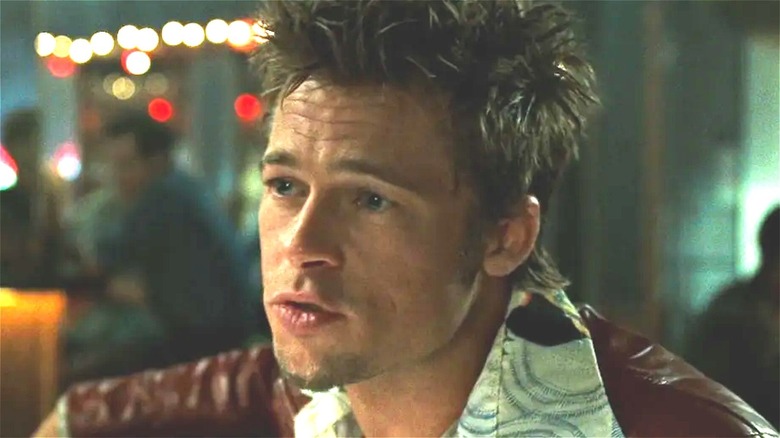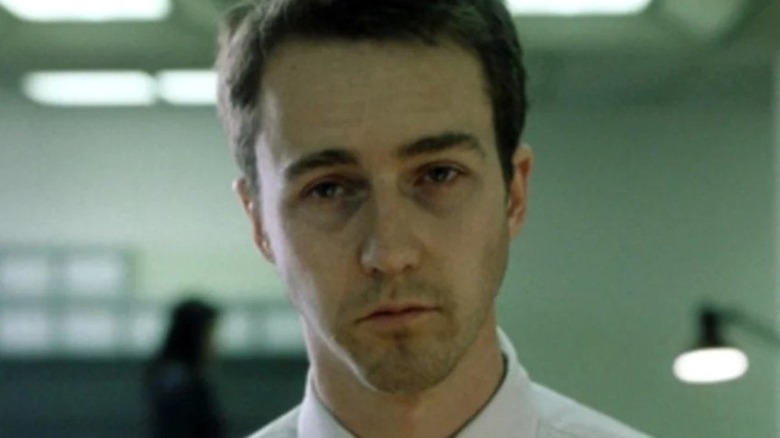The Real Reason Fight Club Bombed At The Box Office
It's time to break the first two rules of "Fight Club." That's right, we're going to talk about "Fight Club," the edgy and controversial 1999 adaptation of author Chuck Palahniuk's novel of the same name. Directed by David Fincher and starring Brad Pitt, Helena Bonham Carter, and Edward Norton, "Fight Club" was all kinds of anti-capitalist gutter chic, telling the tale of the anarchistic soapmaker Tyler Durden (Pitt) and his quest to reset society to zero and have everyone hit bottom, including Norton's nameless narrator. The narrator — an insomniac who works in the compliance and liability department for a major automotive manufacturer, determining if a parts recall is merited for a given failure — comes to meet Tyler when traveling for work. Shortly thereafter, he arrives at his home, only to find that his condo was destroyed in an explosion. With nowhere else to turn, he calls his newest single-serving friend looking for a place to crash, though Tyler eventually reveals he blew up the narrator's apartment. Not wanting to die without any scars, Tyler coaxes the narrator into a parking lot brawl, uttering the immortal line "I want you to hit me as hard as you can." With that, Fight Club was born and soon began to grow, attracting disaffected men of similar minds and backgrounds who were just coasting through existence, waiting for life to happen.
While considered a must-see cult classic now, "Fight Club" was not always a beloved film. Legendary film critics Roger Ebert gave the movie two stars and called it "a celebration of violence in which the heroes write themselves a license to drink, smoke, screw and beat one another up," though a cultural re-examination years later has been kinder to "Fight Club." In addition to faring poorly with some critics, it underperformed financially, though Norton has an idea as to why. Here's the real reason he thinks "Fight Club" bombed at the box office
Edward Norton feels film distributor 20th Century Fox is to blame
David Fincher made "Fight Club" with a $65 million production budget, according to The Numbers, but the film failed to recoup even 60% of that sum at the domestic box office. The film earned $37 million in the United States and $63 million internationally, for a $100 million worldwide gross. When it comes to figuring out who's to blame for the film's financial performance, Edward Norton points the finger directly at distributor 20th Century Fox. Sitting down with PeopleTV's Lola Ogunnaike, Norton laid out his thoughts about industry execs feeling like the film may have been calling them out. "I think there was a reluctance on the part of some of the people who were actually marketing it, to embrace the idea that it was funny, and honestly I think they felt indicted by it," he said. Norton also said people who could relate to his character's smug and cheerless boss, Richard Chesler (Zach Grenier), were unlikely to like the film.
Director David Fincher echoed Norton's sentiments to a certain degree, which he related to author Bryan Rafferty for his book "Best. Movie. Year. Ever.: How 1999 Blew Up the Big Screen." "The people whose job it is to sell it were like, 'I'm not going down with this,' he said (via Den of Geek). The director even quoted an unnamed Fox executive, who reportedly told him "Men do not want to see Brad Pitt with his shirt off. It makes them feel bad. And women don't want to see him bloody. So I don't know who you made this movie for."
Fincher also admitted he engaged in plenty of back and forth with Norton as well. "I think Edward had this idea of, 'Let's make sure people realize that this is a comedy,'" Fincher said. Regardless of how it initially performed with critics and audiences, there's no denying we keep breaking the first two rules of "Fight Club."

